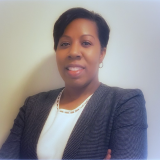Articles
Bringing the Best of FP&A to the Organization
- By AFP Staff
- Published: 5/24/2023

Nikita M. Miller, FPAC, has kept an FP&A lens on her work since her first job, before FP&A was even in her job title. Her interest in looking at the business as a whole ultimately led to her current role as Director of Facilities plus FP&A at The Kresge Foundation in Detroit.
Bryan Lapidus, FPAC, AFP’s Director of FP&A Practice, spoke with Nikita to discuss her career in FP&A, her decision to earn the FPAC and how she keeps learning.
Bryan: What path led you into FP&A?
 Nikita: I always wanted to be in finance. I knew I didn’t want to go into accounting; that part of the business wasn’t as interesting to me. I am interested in looking at the business as a whole — being able to explain what's happening, digging into the details. I found FP&A to be more of a natural fit.
Nikita: I always wanted to be in finance. I knew I didn’t want to go into accounting; that part of the business wasn’t as interesting to me. I am interested in looking at the business as a whole — being able to explain what's happening, digging into the details. I found FP&A to be more of a natural fit.
When I graduated from college, my first job was as a budget analyst for General Motors. I was able to work in various roles within that, keeping that FP&A lens, even though they didn't call it FP&A at the time.
Bryan: You were already the Head of FP&A when you added facilities management to your portfolio. How did that come to be?
Nikita: When I came on board with Kresge, we were expanding our Detroit office, and our CFO needed someone to help with the financials for the expansion. I worked with the facilities team, tracking the costs to align our strategy, infrastructure and budget. I had a chance to work with the facilities director, engineers, architects and construction company for the better part of a year. Later, when the facilities director retired, they looked at my experience and the portability of my skills and asked if I was interested.
The facilities function really looks at this: What does it cost to run this facility? Are we running it efficiently while serving our needs? What changes might be required? Every dollar we save is more money for serving our mission of making grants to the community. I was already close to the numbers from my FP&A work, so looking at the business through that lens made the transition faster.
Bryan: What goals are you working toward this year, either for your department or improvements to a companywide process?
Nikita: We are looking to improve our planning process to make our budgeting more relevant and the process more efficient. Currently, Kresge has a multi-month process that involves several reviews and iterations. I want to get people engaged and keep them engaged through the process. That should lead to more meaningful insights and better outcomes.
Additionally, I feel like I am always working on reporting in ways to empower my partners to make decisions. We just rolled out new reporting for our budget leads across the foundation because people were not touching the data enough. We found that when we met with them once or twice a year, finance was driving a lot of the conversation in part, because the reports didn’t support the end goal. Our new, user-friendly tools should address that!
Bryan: What FP&A skills did you have to learn on the job?
Nikita: One was communication: Don't be afraid to talk about the hard stuff or tell people no. I have had several instances where I have had tough conversations with teams about what they couldn’t do because of capacity constraints, lack of funding or management decisions. There is not really a class for those conversations.
Keeping up with technology and the skills necessary to produce meaningful analysis has been important, and most tools require on-the-job training. And then, as I’ve moved through jobs and different organizations, I found there are people who aren't familiar with what FP&A does or what we can provide. I have had to learn how to sell our services!
Bryan: How do you keep learning?
Nikita: AFP has helped me a lot. I knew other disciplines had certifications or learning programs, but I was searching to find what I could do in my craft, in my area of responsibility, to make sure I am staying on top of things, and to learn and grow as an FP&A professional. That is when I found the FPAC and went through the process.
Then, as an AFP member, I signed up for the webinars, the courses, the conferences, all of those things that are offered. I feel like they help me stay on top of what is going on and allow me to continue to grow my skill set.
Bryan: How has earning the FPAC certification benefited you?
Nikita: Even today when I have problems, I will check the FPAC materials. And, earning the FPAC has shown that I am committed to my work, to growing professionally and to bringing the best of what FP&A has to offer to support the organization.
The AFP community has also been a great resource. I can ask what people are doing in this space, or what tools they are using. Being introduced to this world of colleagues who are going through some of the same things I'm going through, experiencing some of the same things — it is helpful to have that community to reach out to.
A global symbol of excellence, the FPAC is the only certification specific to FP&A that is forward-looking and assesses one’s ability to see the big picture. Get started on your FPAC journey.
Bryan: Looking ahead, what would you say are some critical FP&A issues that you’re facing?
Nikita: Integrating technology skills and FP&A skills will be important moving forward. For example, I am working on a project right now where I have to bring in an outside consultant to write SQL scripts to bridge some data and enable specific reporting for my partners. We know what needs to be connected, we just don't have the skill set in-house to make the connection. For the moment, I need to rely on an outside resource to put it together for me.
I would also say getting better at supporting our leadership, even anticipating what they will need. Of course, sometimes they don't know exactly what they are looking for in an end product until they see it, so it is working with them to define the strategic need, iterate on prototypes and then deliver the final output.
Bryan: How has your experience been on the FP&A Advisory Council?
Nikita: My experience has been great. I really appreciated the invitation to be a part of the team. The interaction, the level of engagement and the consistency. Being able to have those touch points with colleagues and hear what's going on in the space has been very beneficial.
AFP brings together the best and brightest in the profession from all over the world. Join a global community that collaborates and supports each other’s growth, with access to exclusive perks such as in-person networking, live and on-demand training, survey research and economic data, and more. Become an AFP member.
Copyright © 2024 Association for Financial Professionals, Inc.
All rights reserved.

